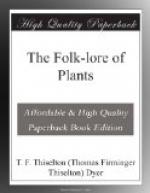Firstly, to dream of white flowers has been supposed to prognosticate death; with which may be compared the popular belief that “if a white rosebush puts forth unexpectedly, it is a sign of death to the nearest house;” dream-omens in many cases reflecting the superstitions of daily life. In Scotch ballads the birch is associated with the dead, an illustration of which we find in the subjoined lines:—
“I dreamed a dreary dream last nicht;
God keep us a’ frae
sorrow!
I dreamed I pu’d the birk sae green,
Wi’ my true love on
Yarrow.
I’ll redde your dream, my sister
dear,
I’ll tell you a’
your sorrow;
You pu’d the birk wi’ your
true love;
He’s killed,—he’s
killed on Yarrow.”
Of the many plants which have been considered of good omen when seen in dreams, may be mentioned the palm-tree, olive, jasmine, lily, laurel, thistle, thorn, wormwood, currant, pear, &c.; whereas the greatest luck attaches to the rose. On the other hand, equally numerous are the plants which denote misfortune. Among these may be included the plum, cherry, withered roses, walnut, hemp, cypress, dandelion, &c. Beans are still said to produce bad dreams and to portend evil; and according to a Leicestershire saying, “If you wish for awful dreams or desire to go crazy, sleep in a bean-field all night.” Some plants are said to foretell long life, such as the oak, apricot, apple, box, grape, and fig; and sickness is supposed to be presaged by such plants as the elder, onion, acorn, and plum.
Love and marriage are, as might be expected, well represented in the dream-flora; a circumstance, indeed, which has not failed to impress the young at all times. Thus, foremost amongst the flowers which indicate success in love is the rose, a fact which is not surprising when it is remembered how largely this favourite of our gardens enters into love-divinations. Then there is the clover, to dream of which foretells not only a happy marriage, but one productive of wealth and prosperity. In this case, too, it must be remembered the clover has long been reckoned as a mystic plant, having in most European countries been much employed for the purposes of divination. Of further plants credited as auguring well for love affairs are the raspberry, pomegranate, cucumber, currant, and box; but the walnut implies unfaithfulness, and the act of cutting parsley is an omen that the person so occupied will sooner or later be crossed in love. This ill-luck attached to parsley is in some measure explained from the fact that in many respects it is an unlucky plant. It is a belief, as we have noticed elsewhere, widely spread in Devonshire, that to transplant parsley is to commit a serious offence against the guardian genius who presides over parsley-beds, certain to be punished either on the offender himself or some member of his family within the course of the year. Once more “to dream of cutting cabbage,” writes Mr. Folkard,[5] “Denotes




